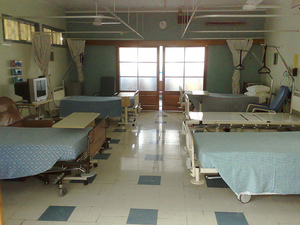 This article, briefly, deals with an important issue in the context of injuries suffered at a hospital due to medical negligence. The question is simple: is your case a medical malpractice case or a case of ordinary negligence on behalf of the hospital? The answer may be extremely complex and requires a keen attorney in this field. The distinction is significant because it will determine whether a significant portion of your compensation, for your injuries, will be restricted to a medical malpractice “cap.” In Georgia, there exist a “cap” on recovery in medical malpractice cases. The Georgia Legislature unfortunately implemented “tort reform” legislation which harmed patients by placing a $350,000 cap (ceiling) on non economic damages (injuries) that anyone receives due to medical malpractice. That means, in Georgia, if you are a victim of medical malpractice, the compensation that you receive for your pain and suffering that cannot be proven by recorded data such as medical bills, rehabilitation, loss wages, and so forth, will be severely limited.
This article, briefly, deals with an important issue in the context of injuries suffered at a hospital due to medical negligence. The question is simple: is your case a medical malpractice case or a case of ordinary negligence on behalf of the hospital? The answer may be extremely complex and requires a keen attorney in this field. The distinction is significant because it will determine whether a significant portion of your compensation, for your injuries, will be restricted to a medical malpractice “cap.” In Georgia, there exist a “cap” on recovery in medical malpractice cases. The Georgia Legislature unfortunately implemented “tort reform” legislation which harmed patients by placing a $350,000 cap (ceiling) on non economic damages (injuries) that anyone receives due to medical malpractice. That means, in Georgia, if you are a victim of medical malpractice, the compensation that you receive for your pain and suffering that cannot be proven by recorded data such as medical bills, rehabilitation, loss wages, and so forth, will be severely limited.
Currently, medical malpractice “caps” are being challenged. But until this cap is overruled or modified, you will need an attorney who can, if possible, manuever around the medical malpractice claim (cap), to give you a stronger chance at higher compensation for your injuries.
In Georgia, “simply because an alleged injury occurs in a hospital setting, a suit to recovery for that injury is not necessarily a medical malpractice action.” For example, if a hospital employee commits a negligent act that injures you, the fact that the employee such as a registered nurse has expert medical credentials does not, by itself, mean that your case is a medical malpractice case and thus subject to the above-mentioned $350,000 cap. One of the determining factors is whether the negligent act required expert medical “judgment.” It’s complicated but one thing is for sure: the unique facts of your situation, as applied to Georgia law, must be scrutinized by a knowledgeable attorney to determine whether your case may be a case of ordinary negligence, instead of medical malpractice. For example, was your injury caused by the failure of a hospital employee to carry out a physician’s instructions or some other administrative or clerical act? Or perhaps the hospital had policies and procedures that were not complied with or failed to implement polices and procedures that comply with established law. Or perhaps the medical equipment that caused your injury was inadequate: in Georgia, hospitals have a duty to provide equipment reasonable suited for its intended uses.
Basically, all the above-mentioned issues fundamentally challenge the adequacy of the services and facilites provided to you rather than challenge the expert medical judgment of a hospital employee. As stated, this area of Georgia law can be very tricky. Your lawyer must understand these distinctions, and more, to effectively represent you.
You should also consider that the characterization of your law suit as a medical malpractice claim or as an ordinary negligence claim means a lot with respect to the procedural requirements that your attorney must navigate through, in order to avoid having your case thrown out of court. The law has made medical malpractice claims tough from the start. For example, by law, if you do file a medical malpractice claim and your attorney fails to attach an expert affidavit to your complaint, then, your complaint is voidable, not void. That means, if the defense team notices that your attorney failed to comply with the law, then they may move to have your case thrown out of court. If your case is thrown out, then you will most likely be forever barred from filing the same medical malpractice complaint. But there are exceptions, especially if the defense team failed to notice the missing affidavit upon answering your complaint. Again, the rules are tricky and tedious.
You need a good attorney to represent your interests while maintaining the strongest possible negotiating position with insurance companies and opposing lawyers. Contact Williams Oinonen LLC LLC at 404-654-0288 for an initial consultation.
 Georgia Injury Lawyer Blog
Georgia Injury Lawyer Blog

